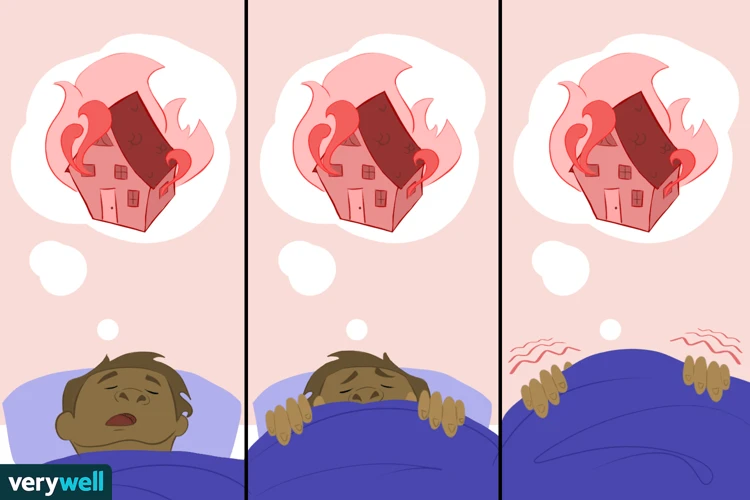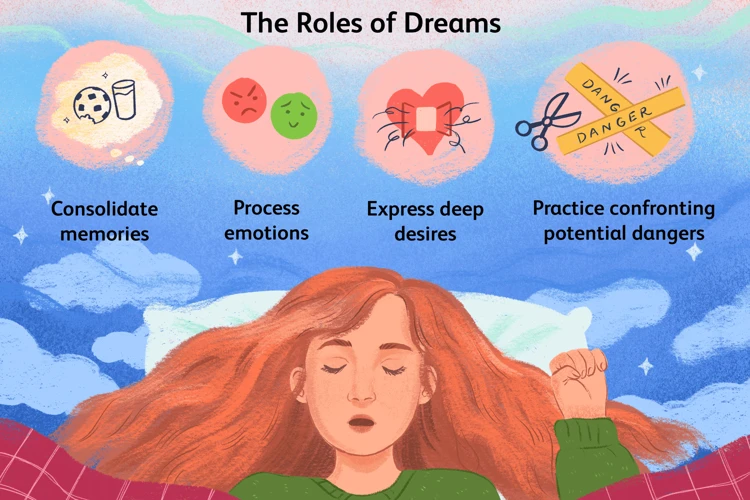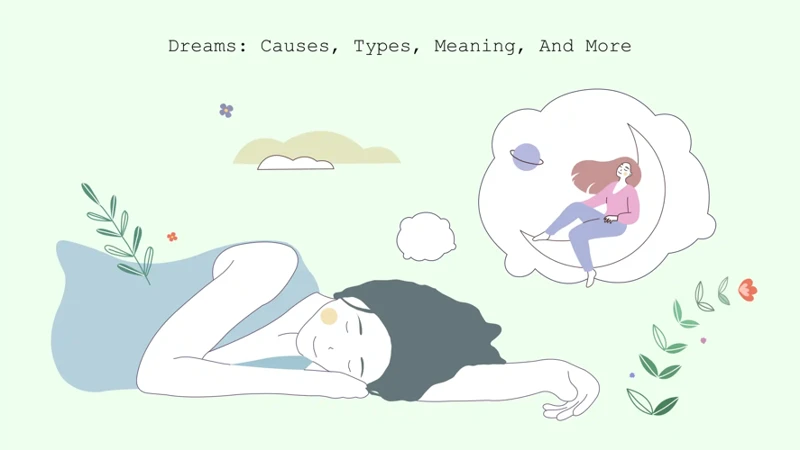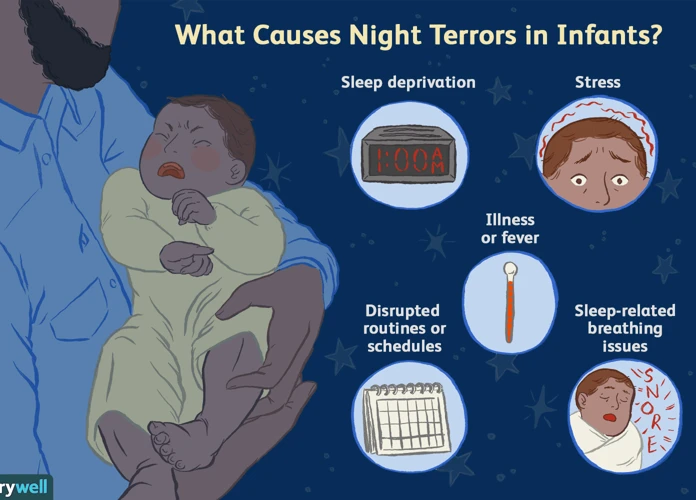Do you wake up in a cold sweat, heart pounding, after a night filled with terrifying dreams? Nightmares can leave us feeling shaken and fearful, disrupting our sleep and leaving us dreading bedtime. Understanding the causes behind these frequent nightmares is essential for finding a solution. In this article, we will delve into the various factors that can contribute to the occurrence of nightmares, explore their impact on our well-being, and provide strategies for overcoming this unsettling phenomenon. So, if you’re tired of being haunted by disturbing dreams, read on to unravel the mysteries of frequent nightmares and regain control of your sleep.
Definition: What Are Nightmares

Nightmares, as defined in the world of sleep psychology, are vivid and distressing dreams that often awaken the sleeper with feelings of intense fear, anxiety, or sadness. These haunting dreams are characterized by their unpleasant content, which can include scenarios involving threats to personal safety, feelings of helplessness, or the presence of menacing figures. Nightmares typically occur during rapid eye movement (REM) sleep, which is the stage of sleep associated with vivid dreaming. During REM sleep, our brains are highly active, and our bodies experience temporary paralysis to prevent us from acting out our dreams. This combination of intense mental activity and physical immobility can make nightmares feel all too real and impactful. It is important to note that isolated nightmares are a normal part of the sleep experience. However, when nightmares become frequent and disrupt our sleep on a regular basis, it may indicate an underlying issue that needs to be addressed. Understanding the causes of nightmares is crucial in order to alleviate their impact and promote restful sleep. To gain deeper insights into the symbols commonly found in nightmares, you can refer to our article on analyzing common symbols in nightmares here. Additionally, if you’re seeking tips on how to improve your sleep and minimize the occurrence of nightmares, check out our recommendations here. Lastly, understanding the effects of medication on the frequency and intensity of nightmares is crucial, and you can explore this topic in more detail in our article on the subject here.
Importance of Understanding Causes

Understanding the causes of frequent nightmares holds great importance in effectively addressing and resolving this distressing sleep phenomenon. By identifying the underlying triggers, individuals can implement targeted strategies to alleviate nightmares and improve their overall sleep quality. Here are some reasons why understanding these causes is crucial:
- Find appropriate solutions: Recognizing the root causes of nightmares allows individuals to seek out the most suitable solutions for their specific situation. Different causes may require different approaches, and understanding the underlying factors helps tailor interventions accordingly.
- Reduce anxiety and fear: Persistent nightmares can lead to increased anxiety and fear surrounding sleep. By understanding the causes, individuals can gain a sense of control, helping to alleviate these negative emotions and promote a more positive attitude towards nighttime rest.
- Improve sleep quality: Frequent nightmares can disrupt the sleep cycle, leading to fragmented and unrestful sleep. By addressing the causes, individuals can work towards creating a more peaceful and rejuvenating sleep environment, ultimately improving their overall sleep quality.
- Enhance psychological well-being: Nightmares can have a significant impact on one’s emotional and mental well-being. By understanding the causes, individuals can address any underlying psychological issues, process traumatic experiences, and work towards healing and growth.
- Promote overall health: Quality sleep is essential for overall health and well-being. By unraveling the causes of nightmares and taking steps to mitigate them, individuals can promote better physical, mental, and emotional health.
Understanding the causes of frequent nightmares empowers individuals to take proactive measures, leading to a reduction in sleep disturbances and an improvement in overall sleep and well-being.
Common Causes of Frequent Nightmares

Frequent nightmares can stem from various underlying causes, and identifying these factors is essential for finding effective solutions. Some common causes of frequent nightmares include:
- Stress and Anxiety: High levels of stress and anxiety can be significant contributors to frequent nightmares. When we are dealing with unresolved stressors or ongoing anxiety, our subconscious mind may express these emotions through distressing dream content.
- Traumatic Experiences: Trauma, such as experiencing accidents, witnessing violence, or surviving a natural disaster, can leave a lasting impact on our psyche. These traumatic experiences can manifest in nightmares as our minds attempt to process and cope with the distressing events.
- Medications and Substance Abuse: Certain medications, such as antidepressants, beta-blockers, or drugs that affect neurotransmitter levels, can influence the occurrence of nightmares. Similarly, substance abuse, particularly alcohol or drug use, can disrupt the sleep cycle and contribute to more frequent nightmares.
- Sleep Disorders: Sleep disorders like sleep apnea, narcolepsy, or restless leg syndrome can disrupt the normal sleep cycle and increase the likelihood of nightmares. Disruptions in the REM sleep stage, where dreams occur most often, can lead to more vivid and intense nightmares.
- Medical Conditions: Certain medical conditions, such as post-traumatic stress disorder (PTSD), anxiety disorders, or mood disorders, can contribute to the frequency of nightmares. Neurological conditions or hormonal imbalances may also play a role.
By understanding these common causes of frequent nightmares, individuals can begin to explore potential triggers in their own lives and work towards addressing and resolving these issues to improve the quality of their sleep.
1. Stress and Anxiety
Stress and anxiety are common culprits when it comes to the occurrence of frequent nightmares. When we are under stress or experiencing anxiety, our minds are often preoccupied with worries and concerns. This mental strain can seep into our dreams, presenting itself in the form of nightmares. The exact mechanisms behind the relationship between stress, anxiety, and nightmares are not fully understood, but research suggests that increased activity in the amygdala, the brain’s emotional center, may play a role. High levels of stress hormones, such as cortisol, can also impact the quality of our sleep and contribute to the likelihood of having nightmares.
It is not uncommon for individuals dealing with chronic stress or anxiety disorders, such as post-traumatic stress disorder (PTSD), to experience recurrent nightmares. These nightmares may be related to past traumatic experiences or represent the fears and anxieties associated with their condition. In a way, nightmares can be seen as the mind’s attempt to process and cope with emotional turmoil.
To address stress and anxiety-related nightmares, it is important to take steps to manage these underlying issues. Engaging in stress-reduction techniques such as deep breathing exercises, mindfulness meditation, or engaging in relaxing activities like yoga or listening to soothing music can help reduce overall stress levels. Seeking support from a mental health professional who specializes in anxiety disorders or trauma can provide valuable guidance and coping strategies to alleviate anxiety and reduce the frequency of nightmares.
It is crucial to acknowledge that stress and anxiety can significantly impact our sleep quality and psychological well-being. By addressing these underlying causes, we can take significant strides towards a better understanding of our nightmares and work towards achieving more peaceful nights.
2. Traumatic Experiences
Traumatic experiences can play a significant role in causing frequent nightmares. When a person goes through a distressing or traumatic event, such as physical or emotional abuse, accidents, natural disasters, or witnessing violence, it can leave a lasting impact on their psyche. These experiences often become ingrained in our subconscious mind and manifest themselves in the form of nightmares. Nightmares related to traumatic experiences typically contain vivid and distressing imagery associated with the event, and they may recur frequently, making it difficult for the individual to find peace during sleep. The content of these nightmares can vary, ranging from reliving the traumatic event to symbolic representations of the fear, helplessness, or intense emotions experienced during the ordeal. It is important to acknowledge that everyone’s response to trauma is unique, and not everyone who experiences a traumatic event will develop frequent nightmares. However, for those who do, seeking therapy and support from mental health professionals can be beneficial. Therapy sessions, such as trauma-focused therapy or Cognitive Behavioral Therapy (CBT), can help individuals process their traumatic experiences, reduce the frequency of nightmares, and promote healing. The support of loved ones and participation in support groups can also be invaluable in coping with trauma and its associated nightmares.
3. Medications and Substance Abuse
Medications and substance abuse can both play a significant role in the occurrence of frequent nightmares. Certain medications, particularly those that affect the central nervous system, have been known to cause vivid and disturbing dreams as a side effect. This can include medications used to treat conditions such as depression, anxiety, and high blood pressure. Antidepressants, in particular, have been associated with an increase in dream activity, including nightmares. It is important to note that not everyone who takes these medications will experience nightmares, as individual reactions can vary.
Substance abuse, including the use of drugs and alcohol, can also contribute to the occurrence of nightmares. In particular, substances that affect the central nervous system, such as stimulants, sedatives, and hallucinogens, can disrupt the normal sleep cycle and lead to more intense and vivid dreams. Alcohol, for example, is known to suppress REM sleep in the early stages of the night, which can result in a rebound effect later in the night when REM sleep becomes more pronounced. This rebound effect is often accompanied by an increase in dream intensity and vividness, which may include nightmares.
If you are experiencing frequent nightmares and are taking medications or engaging in substance abuse, it is important to consult with a healthcare professional. They can evaluate your situation and determine if any adjustments to your medication regimen or substance use are necessary. It is crucial to follow medical advice and guidance when it comes to managing medications and substance abuse in order to minimize the occurrence of nightmares and promote overall well-being.
4. Sleep Disorders
Sleep disorders, such as insomnia, sleep apnea, and restless leg syndrome, can significantly contribute to the occurrence of frequent nightmares. Let’s explore each of these sleep disorders and their potential impact:
1. Insomnia: Insomnia is a sleep disorder characterized by difficulty falling asleep, staying asleep, or experiencing non-restorative sleep. The persistent sleep disruption associated with insomnia can lead to heightened emotional arousal and increased vulnerability to nightmares. Individuals with insomnia often experience heightened levels of stress and anxiety, which can further exacerbate the occurrence of distressing dreams.
2. Sleep Apnea: Sleep apnea is a disorder in which a person experiences pauses in breathing or shallow breathing during sleep. These interruptions in breathing can disrupt the quality of sleep and decrease the amount of time spent in the deep, restorative stages of sleep. Sleep apnea is often associated with vivid and intense dreams, including nightmares. The interruptions in oxygen supply to the brain can affect its functioning and contribute to the occurrence of disturbing dreams.
3. Restless Leg Syndrome (RLS): Restless Leg Syndrome is a neurological disorder characterized by an uncontrollable urge to move the legs, usually accompanied by uncomfortable sensations. RLS can lead to discomfort and an overwhelming need to constantly move the legs, making it difficult to relax and fall into a restful sleep. Individuals with RLS may experience increased nighttime awakenings and a higher likelihood of experiencing nightmares.
4. Narcolepsy: Narcolepsy is a neurological disorder characterized by excessive daytime sleepiness, sudden sleep attacks, and disrupted sleep patterns. The abnormal REM sleep regulation in individuals with narcolepsy can lead to vivid and intense dreams, including nightmares. The sudden transitions between wakefulness and REM sleep can create a fertile ground for the occurrence of distressing dream content.
Addressing these sleep disorders through proper diagnosis and treatment is essential in reducing the frequency of nightmares. Seeking medical advice from a sleep specialist can help identify the underlying causes and develop a targeted treatment plan to manage the sleep disorder and alleviate the associated nightmares.
5. Medical Conditions
Medical conditions can also play a significant role in the occurrence of frequent nightmares. Certain physical and mental health disorders have been linked to an increased likelihood of experiencing disturbing dreams during sleep. One such condition is post-traumatic stress disorder (PTSD). Individuals with PTSD often suffer from recurrent nightmares that reenact their traumatic experiences, causing them to relive the intense emotions associated with the event. Other mental health conditions, such as depression and anxiety disorders, can also contribute to the development of nightmares. These conditions can disrupt sleep patterns and lead to heightened emotional arousal during REM sleep, increasing the likelihood of nightmares. Additionally, sleep disorders like sleep apnea and restless leg syndrome have been associated with nightmares. The interruptions in breathing or discomfort experienced during sleep can awaken the sleeper and lead to vivid and distressing dreams. It is crucial for individuals with medical conditions to work with healthcare professionals to manage their symptoms, as this can also help alleviate the frequency and intensity of nightmares. Understanding the relationship between these medical conditions and nightmares is vital for effective treatment and improving overall sleep quality.
Effects of Frequent Nightmares

Frequent nightmares can have a significant impact on our overall well-being. The emotional and physical toll they take on us can be profound. Here are some of the effects that frequent nightmares can have:
- Disrupted sleep: Nightmares can disrupt our sleep patterns, causing frequent awakenings throughout the night. These interruptions prevent us from getting the restorative sleep we need, leading to daytime fatigue, irritability, and difficulty concentrating.
- Increased anxiety: Experiencing frequent nightmares can lead to heightened levels of anxiety and fear. The lingering emotions from these disturbing dreams can carry over into our waking hours, making it harder to relax and leading to a constant state of unease.
- Impaired mental health: Studies have shown that individuals who experience frequent nightmares are at a higher risk of developing mental health conditions such as anxiety disorders and depression. The distressing content of nightmares can contribute to persistent negative thoughts and feelings.
- Impact on quality of life: The combination of disrupted sleep and heightened anxiety can significantly impact our overall quality of life. Persistent nightmares can lead to a decrease in productivity, difficulty forming and maintaining relationships, and a general sense of dissatisfaction with daily life.
- Physical symptoms: Frequent nightmares can also manifest in physical symptoms such as increased heart rate, sweating, and feelings of tension and unease. These physical responses can further contribute to feelings of exhaustion and stress.
Recognizing the effects of frequent nightmares is crucial in understanding the importance of seeking intervention and finding strategies to cope with and overcome this issue. Taking steps to address and manage nightmares can help improve sleep quality and overall well-being.
Overcoming Frequent Nightmares

Overcoming frequent nightmares requires a multi-faceted approach that addresses both the underlying causes and the symptoms themselves. Here are some effective strategies that can help individuals regain control of their dreams and achieve more peaceful nights of sleep. 1. Relaxation Techniques: Engaging in relaxation exercises such as deep breathing, meditation, and progressive muscle relaxation can help reduce anxiety and promote a sense of calmness before sleep. 2. Cognitive Behavioral Therapy (CBT): CBT techniques, such as image rehearsal therapy and exposure therapy, can be utilized to modify negative thought patterns and create more positive dream scenarios. 3. Medications and Supplements: In some cases, medications or supplements prescribed by a healthcare professional may be used to manage nightmares. However, it’s essential to consult with a doctor before starting any new medications. 4. Creating a Soothing Environment: Establishing a sleep-friendly environment that is dark, quiet, and comfortable can promote relaxation and reduce the likelihood of nightmares. 5. Addressing Underlying Issues: Identifying and addressing any underlying stressors, trauma, or emotional issues through therapy or counseling can help alleviate nightmares. By implementing these strategies and seeking appropriate support, individuals can take significant steps toward overcoming frequent nightmares and achieving more restful sleep.
1. Relaxation Techniques
1. Relaxation Techniques:
When it comes to combatting frequent nightmares, incorporating relaxation techniques into your daily routine can be highly beneficial. These techniques aim to reduce stress, promote relaxation, and create a calming environment for better sleep. Here are a few effective relaxation techniques to consider:
– Deep Breathing: Deep breathing exercises, such as diaphragmatic breathing, can help relax your body and mind. Find a comfortable position, close your eyes, and take slow, deep breaths, filling up your abdomen with air. As you exhale, envision releasing any tension or negative energy from your body.
– Progressive Muscle Relaxation (PMR): PMR involves systematically tensing and then releasing different muscle groups in your body, promoting relaxation and reducing muscle tension. Start from your toes and work your way up to your head, tensing each muscle group for a few seconds before releasing the tension.
– Guided Imagery: Using guided imagery, you can transport your mind to a peaceful and pleasant setting. Close your eyes and imagine yourself in a calming scene, such as a beach or a serene forest. Engage your senses by picturing the sights, sounds, and smells of this tranquil place, allowing yourself to let go of any stress or worries.
– Meditation: Practicing meditation regularly can help quiet the mind and promote a sense of inner peace. Find a quiet space, sit or lie down in a comfortable position, and focus your attention on your breath or a specific object. Whenever your mind starts to wander, gently bring it back to your point of focus.
– Mindfulness: Mindfulness involves being fully present in the current moment and non-judgmentally observing your thoughts and emotions. By practicing mindfulness, you can develop a greater awareness of your experiences and reduce anxiety. Engage in activities like mindful walking, eating, or even simply sitting and observing your surroundings.
Incorporating these relaxation techniques into your daily routine can create a sense of calm before bedtime and help reduce the likelihood of experiencing frequent nightmares. Experiment with different techniques to find what works best for you and make them a consistent part of your self-care routine.
2. Cognitive Behavioral Therapy (CBT)
2. Cognitive Behavioral Therapy (CBT):
Cognitive Behavioral Therapy (CBT) is a highly effective therapeutic approach for treating frequent nightmares. This form of therapy focuses on identifying and modifying negative thought patterns and behaviors that contribute to the development and maintenance of nightmares. Here are some key aspects of CBT that can help individuals overcome their frequent nightmares:
1. Cognitive Restructuring: CBT aims to challenge and reframe negative thoughts and beliefs that contribute to anxiety and fear. Therapists help individuals identify irrational beliefs related to their nightmares and encourage them to replace them with more positive and realistic thoughts. By changing the way individuals think about their nightmares, CBT empowers them to reduce fear and anxiety associated with sleep.
2. Imagery Rehearsal Therapy (IRT): IRT is a specific technique used in CBT for nightmares. It involves a process where individuals vividly imagine a new, positive ending to their recurring nightmares. By repeatedly rehearsing this new ending, individuals learn to modify the content and emotional impact of their nightmares. This technique helps desensitize individuals to their fears and empowers them to regain control over their dreams.
3. Relaxation Techniques: CBT incorporates various relaxation strategies to help individuals manage anxiety and improve sleep quality. These techniques may include deep breathing exercises, progressive muscle relaxation, guided imagery, or meditation. By practicing these relaxation techniques regularly, individuals can reduce overall stress levels and promote better sleep, thus minimizing the frequency and intensity of nightmares.
4. Sleep Hygiene Education: CBT for nightmares often includes education on sleep hygiene practices. Therapists provide guidance on establishing a consistent sleep routine, creating a comfortable sleep environment, and implementing healthy lifestyle habits that promote restful sleep. By improving overall sleep hygiene, individuals can enhance their sleep quality and minimize the likelihood of nightmares.
5. Continued Support and Follow-Up: CBT is not a one-time intervention but rather a process that requires ongoing support and follow-up. Therapeutic sessions focus on monitoring progress, addressing any setbacks, and reinforcing the newly learned coping mechanisms. Continued support from a therapist ensures that individuals maintain their progress and effectively manage their nightmares in the long term.
Cognitive Behavioral Therapy offers a structured and evidence-based approach to address the underlying causes of nightmares and provides individuals with practical skills to overcome them. By working with a trained therapist, individuals can gain control over their nightmares, reduce their frequency, and ultimately improve their overall sleep quality.
3. Medications and Supplements
When it comes to addressing frequent nightmares, medications and supplements can play a significant role in management. Certain medications are known to influence the content and frequency of dreams. Antidepressants, for example, may alter the sleep cycle and lead to vivid dreams or nightmares as a side effect. If you suspect that a medication you are taking is contributing to your nightmares, it is crucial to consult with your healthcare provider before making any changes or stopping any prescribed medication. They may suggest adjusting the dosage or trying an alternative medication to alleviate the situation. It is important to remember that altering medication regimens should always be done under medical supervision.
In addition to medications, some individuals may turn to supplements to manage their nightmares. One such supplement is melatonin, a hormone that regulates sleep-wake cycles. While melatonin is commonly used as a sleep aid, its impact on nightmares is still a subject of debate among experts. Some studies suggest that melatonin may actually reduce the frequency and intensity of nightmares, while others indicate no significant effect. As with any supplement, it is vital to consult with a healthcare professional before using melatonin or any other supplement to address nightmares. They can advise on proper dosages and potential interactions with other medications or health conditions.
Ultimately, when considering medications and supplements for nightmares, personalized medical guidance is essential to ensure the most effective and safe approach. Remember to always communicate openly with your healthcare provider about your concerns and collaborate on finding the best solution for your individual needs.
4. Creating a Soothing Environment
Creating a soothing environment in your bedroom can significantly help in reducing the occurrence of frequent nightmares. Your sleep environment plays a crucial role in promoting a sense of safety and relaxation, ultimately influencing the quality of your sleep. Here are some tips to create a calming atmosphere:
1. Optimize lighting: A dark and quiet room can enhance the quality of your sleep. Consider using blackout curtains or an eye mask to block out any excess light that may disturb your sleep. Soft, dim lighting before bedtime can help signal your body that it’s time to wind down.
2. Choose comforting colors: Colors can have a psychological impact on your mood. Opt for soothing and calming colors, such as calming blues or soft earth tones, in your bedroom decor. Avoid vibrant or stimulating colors that may evoke strong emotions.
3. Declutter your space: A cluttered and chaotic environment can create feelings of anxiety and unease. Keep your bedroom clean and organized, ensuring that it promotes a sense of calmness and relaxation.
4. Create a comfortable sleep environment: Invest in a comfortable mattress, pillows, and bedding that suits your preferences. The physical comfort of your sleep environment can contribute to a sense of security and well-being.
5. Control noise levels: Excessive noise can disrupt your sleep and potentially trigger nightmares. Consider using earplugs or a white noise machine to mask any disturbing sounds and promote a quiet atmosphere.
6. Implement relaxation techniques: Incorporate relaxation techniques into your pre-sleep routine to promote a sense of calmness before bedtime. This can include activities like reading a book, practicing gentle stretching, taking a warm bath, or engaging in meditation or deep breathing exercises.
By creating a soothing environment in your bedroom, you can create a safe and tranquil space that promotes restful sleep and reduces the likelihood of nightmares. Remember, everyone’s preferences for a relaxing environment may vary, so customize your sleep environment to suit your individual needs.
5. Addressing Underlying Issues
Addressing the underlying issues that contribute to frequent nightmares is crucial for finding long-lasting relief. Sometimes, nightmares can be a manifestation of unresolved emotional trauma or unresolved conflicts in our lives. It is essential to identify and confront these underlying issues in order to alleviate the frequency and intensity of nightmares. One effective approach is to seek therapy, particularly cognitive behavioral therapy (CBT), which focuses on identifying and changing negative thought patterns and behaviors. CBT can help individuals process and cope with traumatic experiences or sources of stress and anxiety that may be triggering nightmares. Additionally, practicing relaxation techniques such as deep breathing, meditation, or yoga can help reduce overall stress levels, promote better sleep, and decrease the likelihood of nightmares. Creating a soothing sleep environment by keeping the bedroom dark, quiet, and comfortable can also contribute to better sleep quality. Additionally, establishing a regular sleep schedule and engaging in a wind-down routine before bed can signal to the body that it’s time to relax and prepare for sleep. By addressing and actively working on underlying issues, individuals can take significant steps towards overcoming frequent nightmares and achieving peaceful and restorative sleep.
When to Seek Professional Help
Recognizing when to seek professional help for frequent nightmares is essential for those who are struggling to find relief on their own. While occasional nightmares are generally considered normal, persistent and distressing nightmares can significantly impact one’s overall well-being and quality of life. Here are some indications that it may be time to consult with a healthcare professional:
1. Frequency and Severity: If you experience nightmares on a regular basis, such as multiple times per week, and they are intense or disturbing, it may be a sign that professional help is needed. Persistent nightmares can disrupt sleep patterns and lead to chronic sleep deprivation, which can have detrimental effects on physical and mental health.
2. Interference with Daily Life: If nightmares are causing significant distress or impairment during wakefulness, such as interfering with relationships, work performance, or daily functioning, it is important to seek professional assistance. Nightmares that result in persistent anxiety, depression, or fear can greatly impact one’s overall quality of life.
3. History of Trauma: Individuals who have experienced a traumatic event, such as physical abuse, sexual assault, or war-related trauma, may be more susceptible to frequent nightmares. If trauma-related nightmares persist or worsen over time, it is crucial to seek help from a mental health professional who specializes in trauma and PTSD.
4. Co-Occurring Mental Health Issues: Frequent nightmares can be linked to underlying mental health conditions such as post-traumatic stress disorder (PTSD), anxiety disorders, or depression. If you are already diagnosed with a mental health disorder and are experiencing a significant increase in nightmare frequency or intensity, it may be beneficial to consult with a mental health professional to address both the primary condition and the nightmares.
5. Prolonged Distress: If you have been struggling with frequent nightmares for an extended period, typically lasting longer than a month, without finding relief through self-help strategies or lifestyle changes, it is advisable to seek professional help. Nightmares that persist for an extended duration may require more specialized interventions.
Remember, healthcare professionals, including psychologists, psychiatrists, and sleep specialists, are equipped with the knowledge and expertise to assess your situation, identify underlying causes, and develop tailored treatment plans. Seeking professional help can provide the guidance and support needed to alleviate the distress caused by frequent nightmares and improve overall sleep quality and well-being.
Conclusion
In conclusion, frequent nightmares can significantly impact our sleep quality and overall well-being. By understanding the various causes behind these unsettling dreams, we can begin to address and overcome them. Stress and anxiety, traumatic experiences, medications and substance abuse, sleep disorders, and medical conditions are all potential triggers for nightmares. Recognizing these underlying factors is the first step in finding effective solutions. The effects of frequent nightmares can vary from disrupted sleep patterns and daytime fatigue to heightened anxiety and emotional distress. However, there are several strategies that can help overcome nightmares and promote more peaceful sleep. Relaxation techniques, cognitive-behavioral therapy (CBT), medications and supplements, creating a soothing sleep environment, and addressing underlying issues are all valuable approaches to consider. It is important to know when to seek professional help if nightmares persist or significantly impact daily life. Remember, the road to peaceful sleep and freedom from frequent nightmares may require time and patience, but with the right tools and support, a restful night’s sleep is within reach. So, take a proactive approach towards understanding and addressing the causes of your nightmares, and take back control of your sleep and well-being.
Frequently Asked Questions
1. Can nightmares be an early sign of a mental health condition?
Yes, frequent nightmares can sometimes be an early indication of underlying mental health conditions such as anxiety, depression, or post-traumatic stress disorder (PTSD).
2. Are nightmares more common in children or adults?
Nightmares are more common in children, particularly between the ages of 3 and 6. However, they can occur in adults as well.
3. Can certain foods or drinks trigger nightmares?
While there is no direct evidence linking specific foods or drinks to nightmares, consuming heavy meals, spicy foods, or alcohol close to bedtime can disrupt sleep and potentially increase the likelihood of having unsettling dreams.
4. Do nightmares have any evolutionary purpose?
Some experts speculate that nightmares may have had an evolutionary purpose of preparing us to cope with threats and dangers in our environment. By simulating threatening scenarios during sleep, our brains may have become more skilled at responding to real-life challenges.
5. Can nightmares be inherited?
There is evidence to suggest that a predisposition to nightmares may have a genetic component, meaning that you may be more likely to experience frequent nightmares if they run in your family.
6. Can lack of sleep contribute to the frequency of nightmares?
Yes, sleep deprivation and irregular sleep patterns can disrupt the delicate balance of REM sleep, increasing the occurrence of nightmares.
7. Are recurring nightmares a cause for concern?
Recurring nightmares, especially if they are interfering with day-to-day functioning or causing significant distress, may be a cause for concern and may indicate the need for professional intervention.
8. Can nightmares be a side effect of certain medications?
Yes, certain medications, such as antidepressants, beta blockers, and some blood pressure medications, have been known to cause nightmares as a side effect.
9. Can practicing lucid dreaming help reduce nightmares?
While not a guaranteed solution, some individuals have found that learning and practicing lucid dreaming techniques can help them gain control over their dreams, potentially reducing the occurrence of nightmares.
10. Should I wake someone up if they are experiencing a nightmare?
It is generally recommended to provide comfort and reassurance to someone experiencing a nightmare without abruptly waking them up, as it can disrupt their sleep cycle and make it difficult for them to fall back asleep.








